Understanding the Role of Anger in Recovery
Anger is a universal emotion experienced by many during the challenging journey of addiction recovery. Recognizing its presence and understanding its roots are foundational steps toward healthier emotional regulation. In recovery, unmanaged anger can undermine progress, lead to relapse, and harm relationships. This article explores the complex nature of anger, its triggers, and practical strategies for managing this intense emotion to foster lasting sobriety.
The Complexity of Anger and Its Types in Recovery
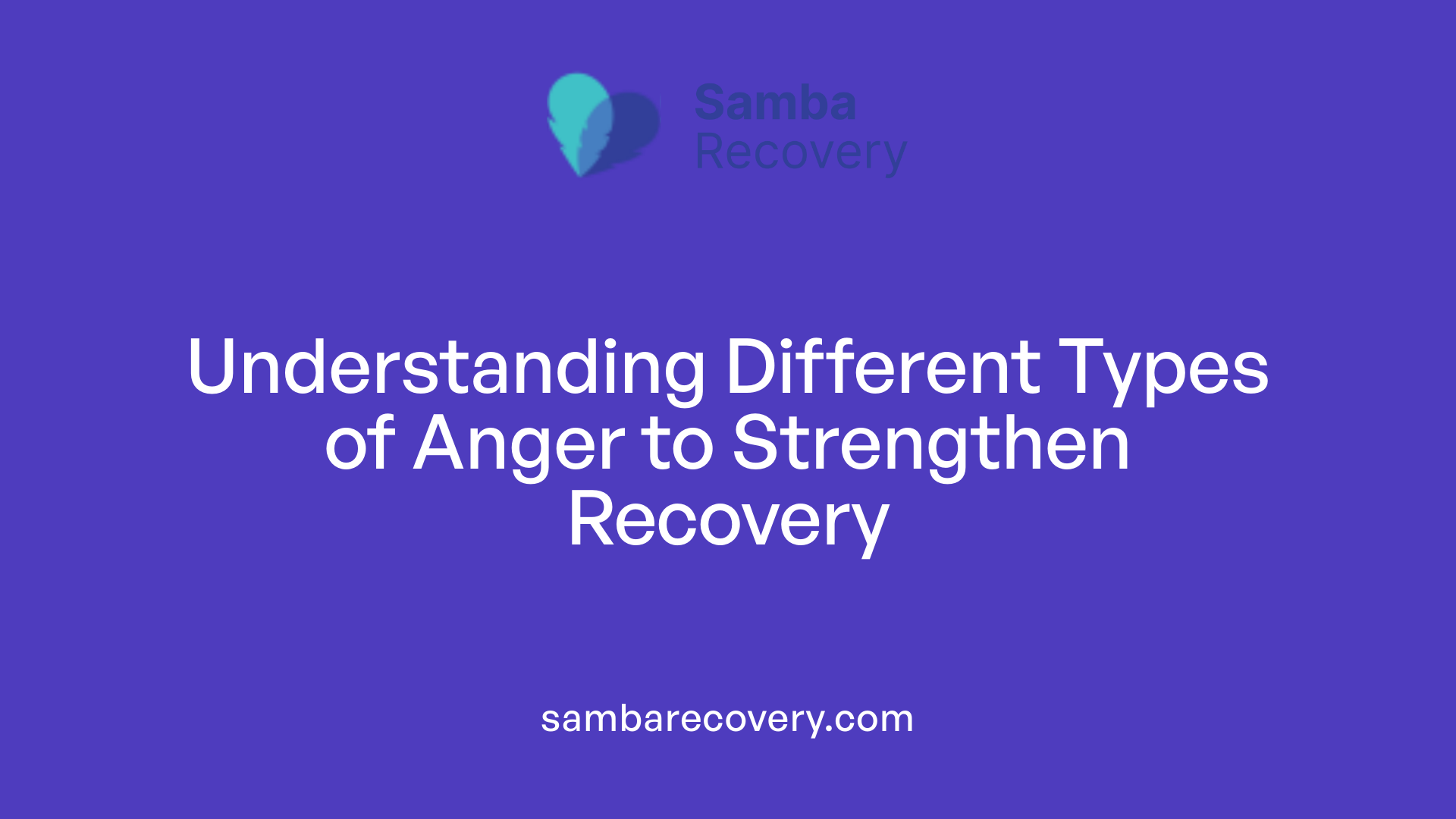
What are the different types of anger and how do they affect the recovery process?
Understanding the various forms of anger is crucial in addiction recovery, as each type can influence emotional stability and the risk of relapse.
Passive-aggressive anger is expressed indirectly, often through sarcasm, subtle digs, or avoidance. This type hides true feelings and can create misunderstandings and resentment in relationships.
Explosive or open aggression involves sudden outbursts of anger, which may be verbal or physical. These episodes can be unpredictable, damaging trust and making it harder to maintain sobriety.
Chronic anger is a persistent, long-term resentment or bitterness that can cloud judgment and fuel negative thought patterns. It often leads to heightened stress levels, increasing health risks like hypertension.
Judgmental anger arises from feelings of being unfairly criticized or not understood. It can cause defensiveness and conflict, hindering effective communication during recovery.
Overwhelmed anger occurs when individuals feel swamped by life’s pressures, leading to frustration and impulsive reactions that destabilize progress.
Retaliatory anger is driven by a desire for revenge or to assert dominance after perceived wrongs. This reactive attitude can escalate conflicts and trigger substance use as a coping mechanism.
Self-abusive anger manifests as self-criticism, shame, or self-harm. It often stems from guilt over past actions and poses significant emotional barriers to healing.
Assertive anger, on the other hand, is expressed constructively by communicating feelings honestly and respectfully. This healthy expression helps establish boundaries and promotes better interpersonal relationships.
In the context of addiction recovery, unmanaged anger—regardless of type—can impede progress by increasing stress, impairing decision-making, and damaging relationships.
Effective management, including therapy, mindfulness exercises, and healthy outlets like journaling or physical activity, is vital. Recognizing the specific type of anger helps tailor these strategies, leading to improved emotional regulation.
Addressing these differences fosters emotional resilience, supports healthier relationships, and enhances the likelihood of long-term sobriety.
Common Triggers and Causes of Anger in Recovery
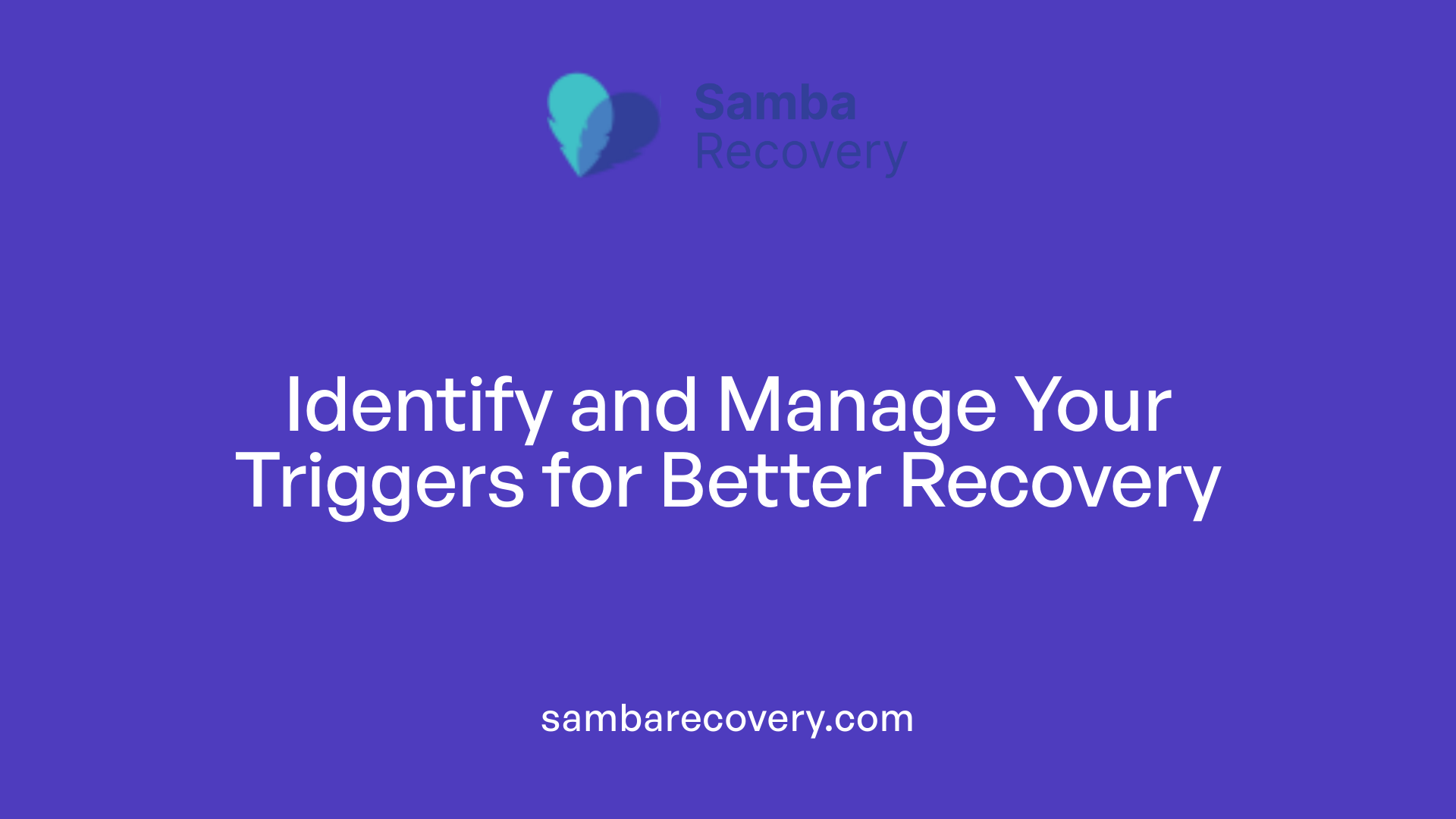
What are common triggers and causes of anger in recovery?
During addiction recovery, many individuals experience frustration, stress, and emotional upheaval that can trigger anger.
One of the primary sources of anger is ongoing stress from daily life challenges, such as managing responsibilities, financial pressures, or relationship issues. These stressors can leave individuals feeling overwhelmed and prone to irritability.
Unresolved trauma and past emotional wounds often resurface during recovery, fueling feelings of anger and frustration. Guilt and shame over past substance use or personal mistakes can also intensify emotional distress.
Physical symptoms associated with withdrawal or ongoing health issues, such as discomfort, fatigue, or pain, can additionally increase irritability and short temper.
Emotional issues like anxiety, depression, or feelings of being misunderstood, unsupported, or isolated deepen anger responses. Social conflicts or unmet emotional needs can further escalate these feelings.
Environmental factors, including social isolation, stressful surroundings, or exposure to triggering environments, contribute to heightened anger.
Recognizing these triggers is vital. Employing coping skills such as mindfulness, relaxation exercises, and seeking professional help can help manage anger effectively.
Understanding the root causes of anger enables individuals in recovery to develop healthier responses, ultimately supporting sustained sobriety and emotional stability.
Practical Strategies for Managing Anger in Recovery
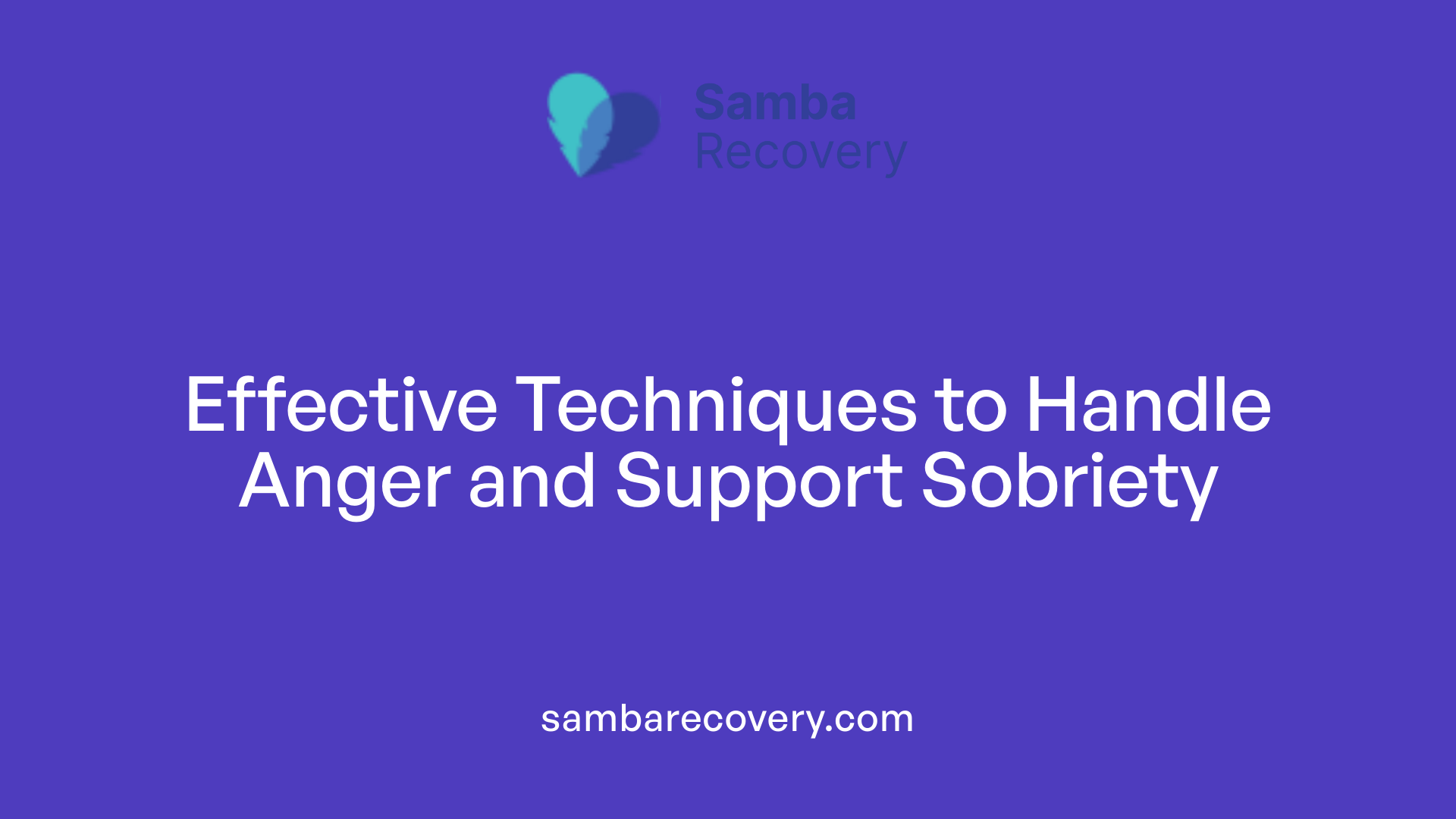
What effective techniques and strategies for managing feelings of anger during addiction recovery?
Managing anger effectively is an essential part of maintaining sobriety during addiction recovery. Practical techniques include deep breathing exercises, which help calm the physiological response to anger by slowing the heart rate and reducing stress hormones.
Mindfulness and meditation are powerful tools that promote present-moment awareness, helping individuals observe their emotions without impulsive reactions. Regular practice of these techniques can improve emotional regulation over time.
Physical activity, such as running, yoga, or even walking, serves as a healthy outlet for releasing built-up tension and energy. Engaging in regular exercise not only boosts mood but also produces endorphins, which help combat anger and frustration.
Developing strong communication skills, like assertiveness and active listening, can prevent conflicts and misunderstandings that often trigger anger. Expressing feelings calmly and respectfully helps to resolve issues constructively.
Seeking support from mental health professionals through therapy—especially Cognitive Behavioral Therapy (CBT)—can address deep-rooted emotional issues and teach anger management strategies tailored to individual needs.
Joining support groups offers a safe space to share experiences, learn from others, and develop coping skills alongside peers facing similar challenges.
Journaling is another effective method for processing emotions; writing about feelings and triggers provides insight and promotes emotional clarity.
Creative outlets such as art, music, or writing allow expression in non-confrontational ways. These activities help in understanding and channeling anger into productive efforts.
Lastly, leaning on loved ones for support and honest communication can provide reassurance and emotional stability. Building a network of understanding individuals is vital in navigating the ups and downs of recovery.
By adopting these strategies—deep breathing, mindfulness, physical activity, healthy communication, therapy, support groups, journaling, and creative outlets—individuals can better regulate their anger, reducing the risk of relapse and promoting long-term sobriety.
Therapeutic Approaches and Resources for Anger Management
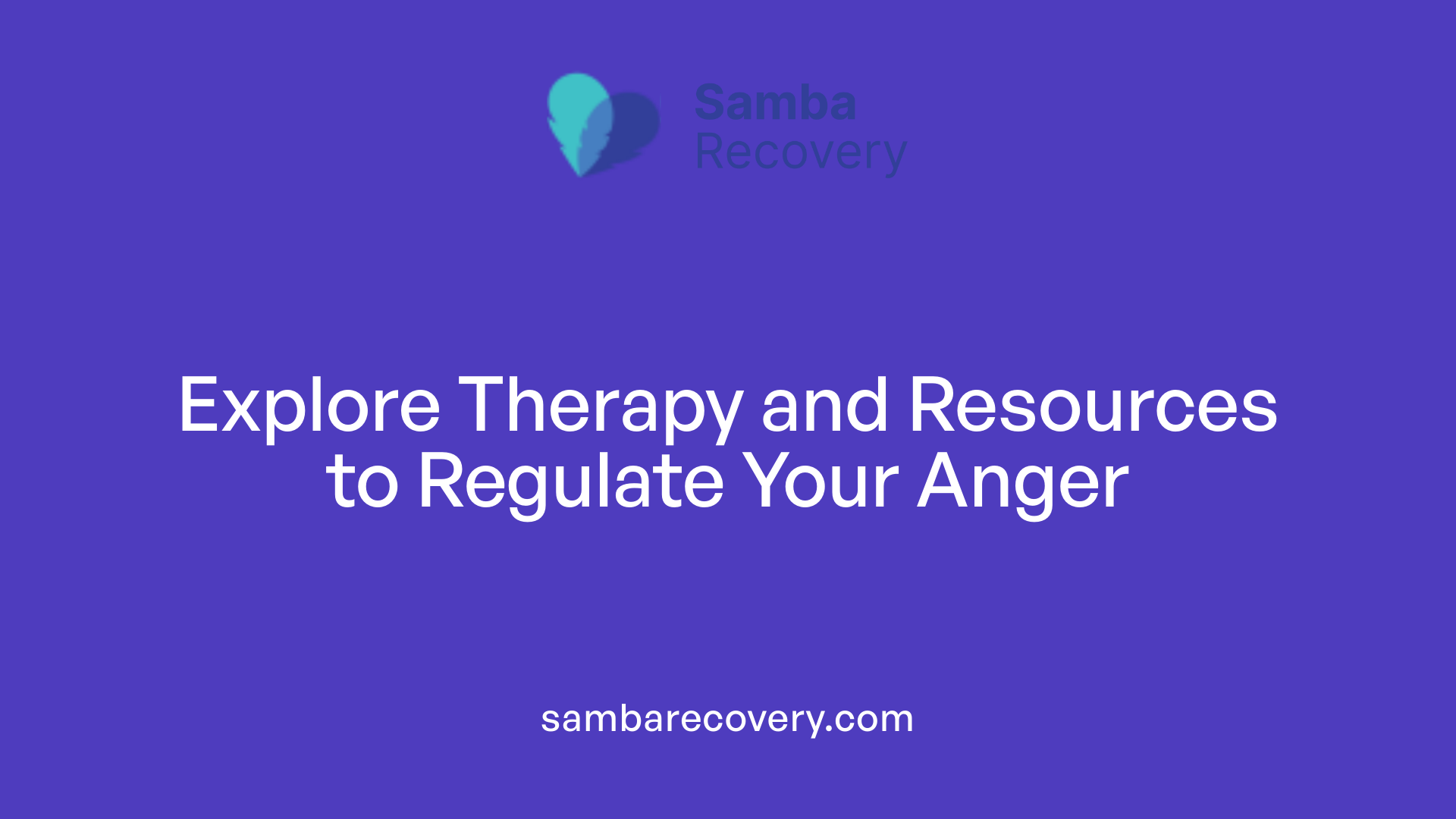
Several therapeutic methods and support services are available to help individuals manage anger during recovery. Cognitive-behavioral therapy (CBT) plays a central role by helping individuals identify and challenge negative thought patterns that fuel anger, promoting healthier responses. Mindfulness and meditation practices are also effective, enabling people to stay present and reduce emotional overwhelm.
Creative outlets like art therapy, journaling, and expressive activities allow emotional expression in a non-confrontational way, aiding in stress reduction. Physical activities such as yoga, running, lifting weights, and cycling serve as healthy outlets for frustration, releasing endorphins that improve mood.
Support groups and individual counseling provide ongoing guidance, offering a safe space to explore underlying issues like trauma or mental health concerns. Support resources like anger management classes teach skills to recognize triggers and practice calming techniques.
Relaxation strategies, including deep breathing exercises, quick de-stressing methods like taking walks or stretching, and engaging the senses help defuse anger episodes promptly. Addressing deep-seated trauma through therapy is crucial for emotional healing and long-term sobriety.
Incorporating these approaches into a personalized treatment plan supports emotional regulation, reduces relapse risk, and fosters a more stable recovery journey.
Healthy Expression and Handling of Anger in Sobriety
How can self-awareness help in managing anger during recovery?
Developing self-awareness is fundamental in managing anger effectively. Recognizing physical warning signs such as clenched fists, rapid heartbeat, or tense shoulders allows individuals to intervene before anger escalates. Reflecting on thoughts and emotions helps identify underlying triggers like frustration, stress, or past trauma. Journaling feelings or thoughts can deepen understanding of personal anger patterns, promoting mindful responses rather than reactive behaviors.
What role does assertive communication play in handling anger?
Assertive communication is key to expressing feelings without hostility. Using ‘I’ statements helps convey emotions clearly and respectfully, such as saying, "I feel upset when…" instead of resorting to criticism or blame. This approach fosters understanding and prevents escalation of conflicts. Practicing assertiveness strengthens boundaries, making it easier to address issues healthily and maintain relationships during recovery.
Why are boundaries important in managing anger?
Setting and respecting boundaries is crucial to prevent feelings of being overwhelmed or unfairly treated, which can trigger anger. Healthy boundaries clarify personal limits and expectations. Learning to say no and advocating for oneself reduces frustration and emotional buildup. It also encourages mutual respect, fostering safer interactions and reducing conflicts that may lead to relapse.
How does self-care contribute to emotional regulation?
Consistent self-care routines help maintain emotional balance and resilience. Engaging in activities like exercise, meditation, or hobbies can diminish stress and improve mood. Prioritizing sleep, nutritious eating, and relaxation techniques supports physical health, which directly influences emotional stability. Self-care acts as a preventative measure, reducing the likelihood of anger outbursts and promoting overall well-being in recovery.
Why is patience vital in managing anger?
Recovery involves gradual progress, and practicing patience can prevent frustration and impulsive anger. Understanding that emotional regulation takes time fosters compassion towards oneself. Recognizing triggers and responses as part of the healing process encourages persistence. Patience allows for more thoughtful reactions, reducing the risk of damaging conflicts or relapse.
When should one seek professional help for anger issues?
Professional help becomes essential if anger feels unmanageable, leads to self-harm or harming others, or causes legal or relationship problems. Therapies like cognitive-behavioral therapy (CBT) and specialized anger management programs offer tools to identify triggers, challenge negative thoughts, and develop healthier coping skills. Support from addiction counselors or mental health professionals ensures tailored strategies that address both anger and underlying issues, promoting sustained sobriety and emotional health.
The Impact of Unmanaged Anger on Overall Recovery and Health
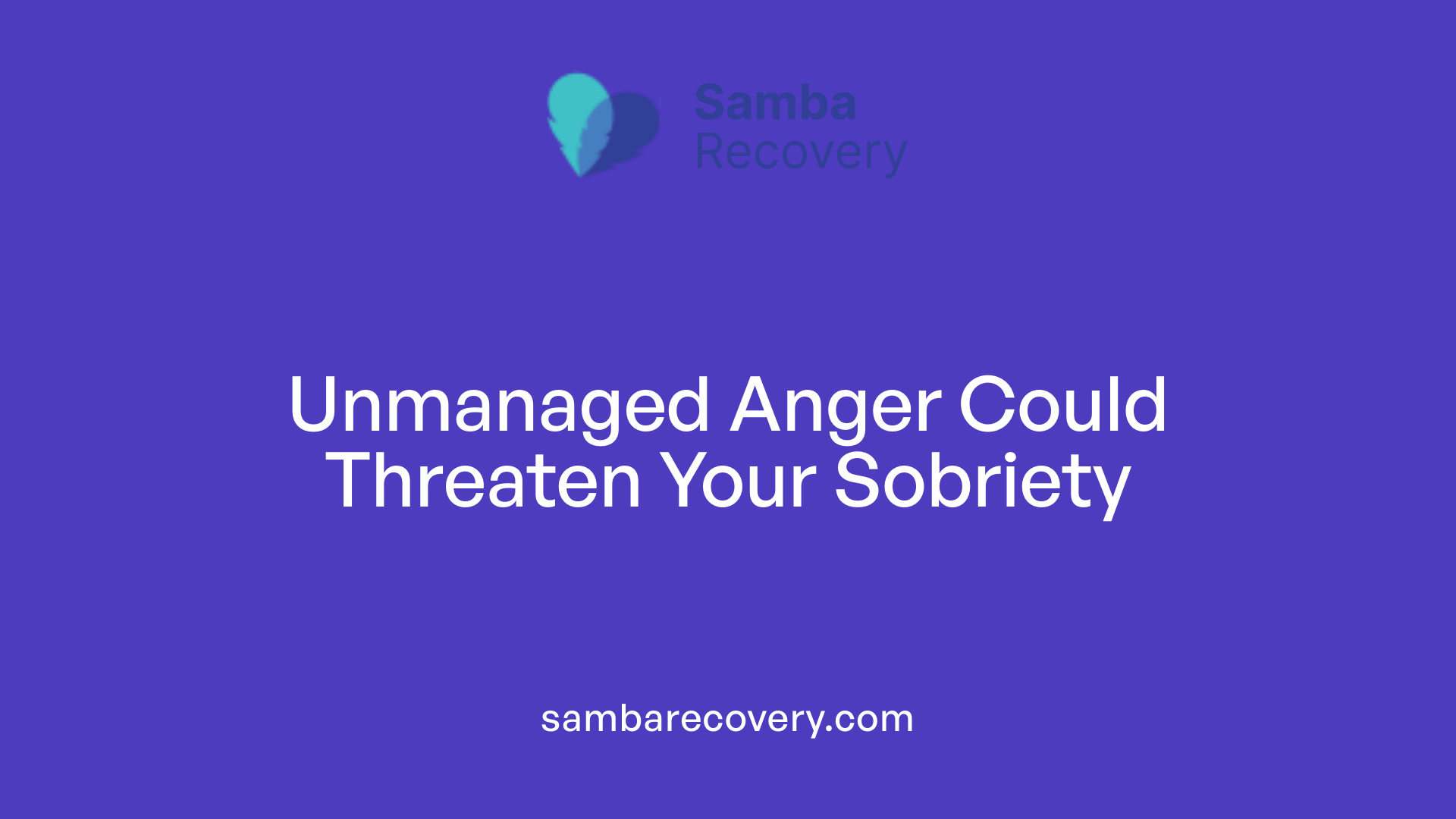
How does anger influence the recovery process and mental health?
Uncontrolled anger can be a significant hurdle in addiction recovery, affecting both mental and physical well-being. When anger is not properly managed, it often leads to increased stress, which impairs clear thinking and decision-making. This emotional turbulence can weaken an individual’s resolve to stay sober and strain important relationships.
From a mental health perspective, chronic anger exacerbates conditions like depression and anxiety. It can create a cycle of emotional instability, making recovery more difficult. The physical effects are equally concerning. Prolonged anger activates the fight-or-flight response, releasing stress hormones such as cortisol and adrenaline. These can lead to health issues like high blood pressure, heart disease, digestive problems, and weakened immunity.
Effectively addressing anger through therapies like cognitive-behavioral therapy (CBT), mindfulness, deep-breathing exercises, and assertive communication is crucial. These tools help individuals recognize triggers, process emotions constructively, and build resilience against relapse.
In summary, managing anger is essential for improving mental stability, protecting physical health, maintaining healthy relationships, and ensuring a successful long-term recovery. Developing healthier emotional responses ultimately supports sustained sobriety and overall well-being.
Long-Term Benefits of Anger Management for Sobriety and Wellness
How important is anger management for maintaining long-term recovery and mental health?
Managing anger effectively is crucial for those in recovery from addiction. Uncontrolled anger can lead to impulsive actions, poor decision-making, and damaged relationships—all of which threaten sobriety.
Persistent anger also impacts physical health, increasing risks for conditions such as high blood pressure and heart disease. Mentally, unresolved anger may contribute to depression, anxiety, and exacerbate other mental health disorders, making recovery more difficult.
Strengthening emotional regulation through various strategies is essential. Professional therapies like cognitive-behavioral therapy (CBT) and dialectical behavior therapy (DBT) help identify anger triggers and develop healthier responses. Mindfulness practices and relaxation exercises, including deep breathing and meditation, can calm physiological arousal during moments of stress.
Healthy expression techniques—such as journaling, creative outlets, or constructive communication—allow individuals to process emotions without resorting to harmful behaviors.
Addressing underlying issues like trauma or co-occurring mental health conditions with tailored treatment supports emotional stability.
Developing these skills not only reduces the likelihood of relapse but also improves overall emotional resilience and quality of life. Managing anger in recovery creates a foundation for lasting sobriety by promoting physical health, mental well-being, and healthier relationships.
Fostering Emotional Resilience for a Sobriety-Focused Future
Managing feelings of anger effectively is a cornerstone of successful recovery. By recognizing the different types of anger, understanding their triggers, and utilizing a range of therapeutic and practical strategies, individuals can develop healthier emotional responses. Techniques such as mindfulness, cognitive-behavioral approaches, creative outlets, and strong support systems empower recovering individuals to navigate setbacks with resilience. Addressing unresolved trauma and fostering emotional awareness are vital steps that help prevent relapse and improve overall mental health. Ultimately, embracing anger management as a vital part of recovery not only supports sobriety but also enhances personal growth, relationship quality, and physical wellbeing, paving the way for a healthier, more balanced life.
References
- How Managing Anger is Important in Addiction Recovery
- National Helpline for Mental Health, Drug, Alcohol Issues – SAMHSA
- Coping with Anger in Addiction Recovery
- Anger Management in Recovery
- Addiction and Anger Management
- 5 Anger Management Tips for Recovery – Ashley Addiction Treatment
- How do I deal with anger in recovery? – MHA Screening
- Coping with Anger in Addiction Recovery | Different Forms of Anxiety






